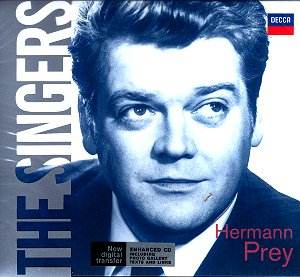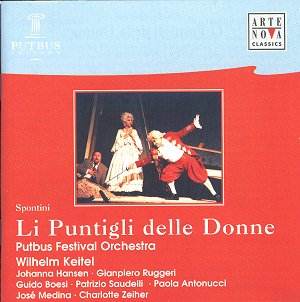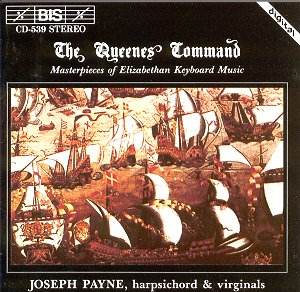 Composer: Hermann Prey
Composer: Hermann Prey
Works: Arias by Rossini & Mozart; Lieder by Schubert, Schumann, Brahms, and R. Strauss
Performers: Hermann Prey (baritone), Karl Engel (piano), Various orchestras conducted by Claudio Abbado, Georg Solti, Karl Böhm
Recording: 1962-1971, Decca 467 901-2 [64.04]
Label: Decca
Hermann Prey, a distinguished baritone whose career spanned the latter half of the 20th century, emerges in this recording as a compelling figure within the rich tapestry of lieder and operatic tradition. The “The Singers” series from Decca, which aims to celebrate the artistry of the foremost vocalists from the first century of recording, presents a selection of Prey’s performances that reflect his dual affinity for the operatic stage and the intimate world of song. With an emphasis on works by the likes of Schubert, Schumann, and Brahms, alongside vibrant operatic excerpts, this compilation offers a nuanced glimpse into Prey’s interpretative prowess.
The recordings, spanning nearly a decade, showcase Prey’s lyric baritone in various contexts, revealing both the breadth of his repertoire and the evolution of his artistry. Engagingly, the lieder selections dominate the disc, where Prey’s sensitive approach is particularly evident. In Schubert’s “Der Hildalgo” (track 11), while a fuller vocal weight could have enhanced the emotional impact, Prey’s nuanced phrasing and expressive soft dynamics create an intimate connection with the text. Similarly, Schumann’s “Mein Rose” (track 2) stands out for its heartfelt delivery, where Prey’s exquisite mezza voce captures the tender essence of the song, exemplifying his keen interpretative insight. The recording of Brahms’ “Wiegenlied” (track 14) radiates a serene magic, characterized by an effortless legato and warmth that transcends the limitations of the 1962 recording’s somewhat flat acoustic.
The operatic excerpts provide a lively contrast to the lieder, with Prey’s engaging portrayal of Figaro in Rossini’s “Largo al factotum” under Claudio Abbado (track 10) revealing his innate charm and vocal agility. However, when juxtaposed against the more robust bass-baritones who have taken on this role, Prey’s interpretation may seem somewhat lightweight, particularly in the context of a contemporary listening experience that often revels in greater vocal heft. Nonetheless, his spirited performance in “Dunque io son” alongside Teresa Berganza is a highlight, showcasing a delightful interplay that is both musically and dramatically satisfying.
While the engineering quality of this collection may not rival the pristine standards of modern recordings, the historical significance of Prey’s artistry cannot be overstated. The initial recordings, made during a time when the technical possibilities were limited, still manage to encapsulate the vibrancy of his voice and the expressive depth he brought to both lieder and opera. The decision by John Ardoin to compile this selection, while perhaps idiosyncratic given the wealth of lieder repertoire, serves to illuminate Prey’s particular strengths as both a singer and an interpreter.
This disc ultimately presents a well-rounded, if compact, survey of Hermann Prey’s remarkable contributions to the art of song. Despite some reservations regarding the acoustic limitations and a desire for a more extensive collection, Prey’s artistry shines through, marked by a marriage of technical skill and interpretative depth. His performances, particularly in the lieder repertoire, resonate with an emotional clarity that remains compelling, making this recording a valuable addition to the legacy of one of the 20th century’s great baritones.



